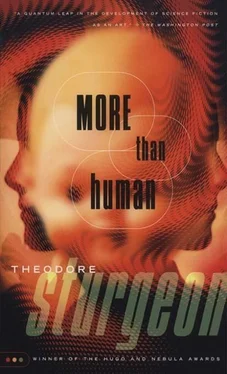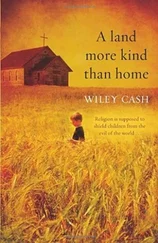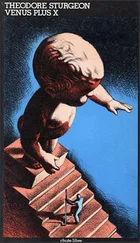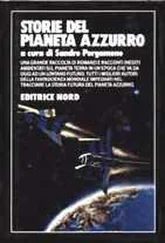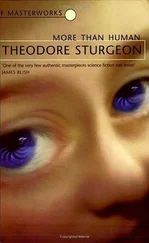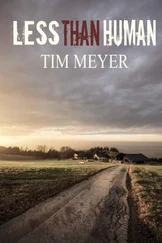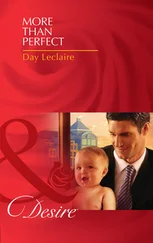Theodore Sturgeon - More Than Human
Здесь есть возможность читать онлайн «Theodore Sturgeon - More Than Human» весь текст электронной книги совершенно бесплатно (целиком полную версию без сокращений). В некоторых случаях можно слушать аудио, скачать через торрент в формате fb2 и присутствует краткое содержание. Год выпуска: 1953, Жанр: Фантастика и фэнтези, на английском языке. Описание произведения, (предисловие) а так же отзывы посетителей доступны на портале библиотеки ЛибКат.
- Название:More Than Human
- Автор:
- Жанр:
- Год:1953
- ISBN:нет данных
- Рейтинг книги:5 / 5. Голосов: 1
-
Избранное:Добавить в избранное
- Отзывы:
-
Ваша оценка:
- 100
- 1
- 2
- 3
- 4
- 5
More Than Human: краткое содержание, описание и аннотация
Предлагаем к чтению аннотацию, описание, краткое содержание или предисловие (зависит от того, что написал сам автор книги «More Than Human»). Если вы не нашли необходимую информацию о книге — напишите в комментариях, мы постараемся отыскать её.
More Than Human — читать онлайн бесплатно полную книгу (весь текст) целиком
Ниже представлен текст книги, разбитый по страницам. Система сохранения места последней прочитанной страницы, позволяет с удобством читать онлайн бесплатно книгу «More Than Human», без необходимости каждый раз заново искать на чём Вы остановились. Поставьте закладку, и сможете в любой момент перейти на страницу, на которой закончили чтение.
Интервал:
Закладка:
He watched her and when she was finished he came to her and put out his hand for the shirt, but she shook her head and pointed. ‘A clean one.’
He found a knitted pullover polo shirt. While he dressed she washed his dishes and the frying pan and straightened out the bed. He lay back in the easychair and she knelt before him and worked the soggy dressing off his left hand, inspected the cuts and bound them up again. The bandage was firm and comforting. ‘You can do without the sling now,’ she said, pleased. She got up and went to the bed. She sat there facing him, still again except for her eyes, except for her mouth.
Outside an oriole made a long slender note, broke it, and let the fragments fall through the shining air. A stake-bed truck idled past, busily shaking the string of cowbells on its back, while one hoarse man and one with a viola voice flanked it afoot, chanting. In one window came a spherical sound with a fly at its heart and at the other appeared a white kitten. Out by the kitten went the fly and the kitten reared up and batted at it, twisted and sprang down out of sight as if it had meant all along to leave; only a fool would have thought it had lost its balance.
And in the room was quiet and a watchfulness which was without demand, except perhaps a guarding against leaving anything unwatched. The girl sat with her hands aslumber and her eyes awake, while a pipe-cleaner man called Healing was born in all his cores, all his marrow, taking the pose of his relaxed body, resting and growing a little and resting again and growing.
Later, she rose. Without consultation, but merely because it seemed time to do so, she picked up a small handbag and went to the door where she waited. He stirred, rose, went to her. They went out.
They walked slowly to a place where there was smooth rolling land, mowed and tended. Down in the hollow some boys played Softball. They stood for a while, watching. She studied his face and when she saw reflected in it only the moving figures and not the consecutive interest of the game itself, she touched his elbow and moved on. They found a pond where there were ducks and straight cinder paths with flower beds. She picked a primrose and put it in his lapel. They found a bench. A man pushed a bright clean wagon up to them. She bought a frankfurter and a bottle of soda and handed them to him. He ate and drank silently.
It was a quiet time they had together.
When it began to grow dark, she brought him back to the room. She left him alone for half an hour and returned to find him sitting just where she had left him. She opened packages and cooked chops and mixed a salad, and while he was eating, made more coffee. After dinner he yawned. She was on her feet immediately. ‘Good night,’ she said, and was gone.
He turned slowly and looked at the closed door. After a time he said, ‘Good night.’ He undressed and got into bed and turned out the light.
The next day was the day they rode on a bus and lunched in a restaurant.
The day after that was the one they stayed out a little later to see a band concert.
Then there was the afternoon when it rained and they went to a movie which he watched wordlessly, not smiling, not frowning, not stirring to the musical parts.
‘Your coffee.’ ‘Let’s get these to the laundry.’ ‘Come.’ ‘Good night.’ These were the things she said to him. Otherwise she watched his face and, undemandingly, she waited.
He awoke, and it was too dark. He did not know where he was. The face was there, wide-browed, sallow, with its thick lenses and its pointed chin. Wordlessly, he roared at it and it smiled at him. When he realized that the face was in his mind and not in the room, it disappeared… no; it was simply that he knew it was not there. He was filled with fury that it was not there; his brain was fairly melting with rage. Yes, but who is he? he asked, and answered, ‘I don’t know, I don’t know, I don’t know…’ and his voice became a moan, softer and softer and softer until it was gone. He inhaled deeply and then something inside him slipped and fell apart and he began to cry. Someone took his hand, took his other hand, held them together; it was the girl; she’d heard him, she’d come. He was not alone.
Not alone… it made him cry harder, bitterly. He held her wrists as she bent over him, looked up through darkness at her face and her hair and he wept.
She stayed with him until he was finished and for as long afterwards as he held her hand. When he released it he was asleep, and she drew the blanket up to his chin and tiptoed out.
In the morning he sat on the edge of the bed, watching the steam from his coffee spread and fade in the sunlight, and when she put the eggs before him he looked up at her. His mouth quivered. She stood before him, waiting.
At last he said, ‘Have you had your breakfast yet?’
Something was kindled in her eyes. She shook her head.
He looked down at the plate, puzzling something out. Finally he pushed it away from him a fraction of an inch and stood up. ‘You have this,’ he said. ‘I’ll fix some more.’
He had seen her smile but he had not noticed it before. Now, it was as if the warmth of all of them was put together for this one. She sat down and ate. He fried his eggs, not as well as she had done, and they were cooked before he thought of toast and the toast burned while he was eating the eggs. She did not attempt to help him in any way, even when he stared blankly at the little table, frowned and scratched his jaw. In his own time he found what he was looking for—the other cup on top of the dresser. He poured fresh coffee for her and took the other which she had not touched, for himself, and she smiled again.
‘What’s your name?’ he asked her, for the very first time.
‘Janie Gerard.’
‘Oh.’
She considered him carefully, then stretched down to the footpost of the bed where her handbag hung by its strap. She drew it towards her, opened it, and took out a short piece of metal. At first glance, it was a piece of aluminium tubing, perhaps eight inches long and oval in cross-section. But it was flexible—woven of tiny strands rather than extruded. She turned his right hand palm up, where it lay beside his coffee cup, and put the tubing into it.
He must have seen it for he was staring down into the cup. He did not close his fingers on it. His expression did not change. At length he took a slice of toast. The piece of tubing fell, rolled over, hung on the edge of the table and dropped to the floor. He buttered his toast.
After that first shared meal there was a difference. There were many differences. Never again did he undress before her or ignore the fact that she was not eating. He began to pay for little things—bus fares, lunches, and, later, to let her precede him through doorways, to take her elbow when they crossed streets. He went to the market with her and carried the packages.
He remembered his name; he even remembered that the ‘Hip’ was for ‘Hippocrates’. He was, however, unable to remember how he came by the name, or where he had been born, or anything else about himself. She did not urge him, ask him. She simply spent her days with him, waiting. And she kept the piece of aluminium webbing in sight.
It was beside his breakfast plate almost every morning. It would be in the bathroom, with the handle of his toothbrush thrust into it. Once he found it in his side jacket pocket where the small roll of bills appeared regularly; this one time the bills were tucked into the tubing. He pulled them out and absently let the tubing fall and Janie had to pick it up. She put it in his shoe once and when he tried to put the shoe on and could not, he tipped it out on to the floor and let it lie there. It was as if it were transparent or even invisible to him; when, as in the case of finding his money in it, he had to handle it, he did so clumsily, with inattention, rid himself of it and apparently forgot it. Janie never mentioned it. She just quietly put it in his path, time and time again, patient as a pendulum.
Читать дальшеИнтервал:
Закладка:
Похожие книги на «More Than Human»
Представляем Вашему вниманию похожие книги на «More Than Human» списком для выбора. Мы отобрали схожую по названию и смыслу литературу в надежде предоставить читателям больше вариантов отыскать новые, интересные, ещё непрочитанные произведения.
Обсуждение, отзывы о книге «More Than Human» и просто собственные мнения читателей. Оставьте ваши комментарии, напишите, что Вы думаете о произведении, его смысле или главных героях. Укажите что конкретно понравилось, а что нет, и почему Вы так считаете.
